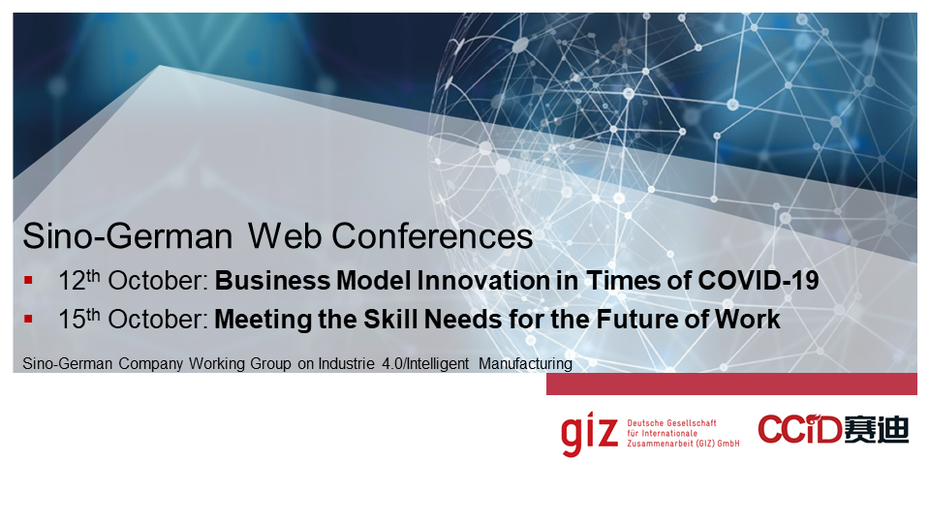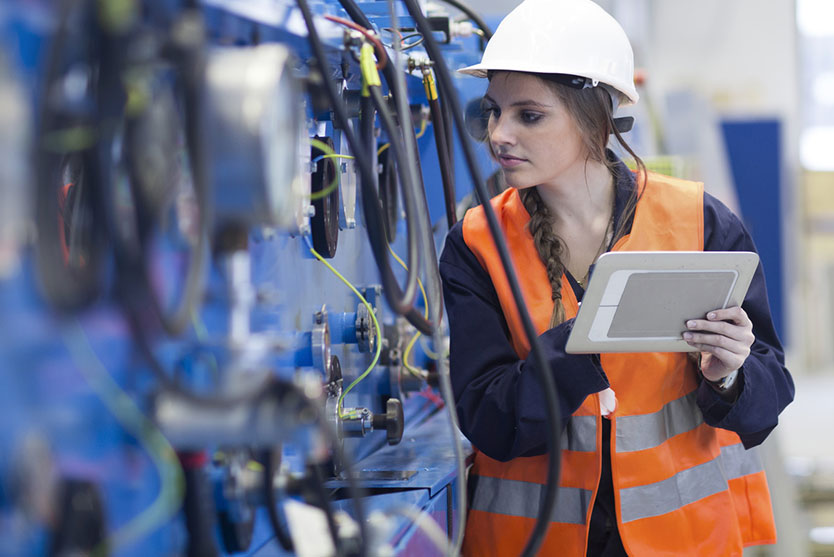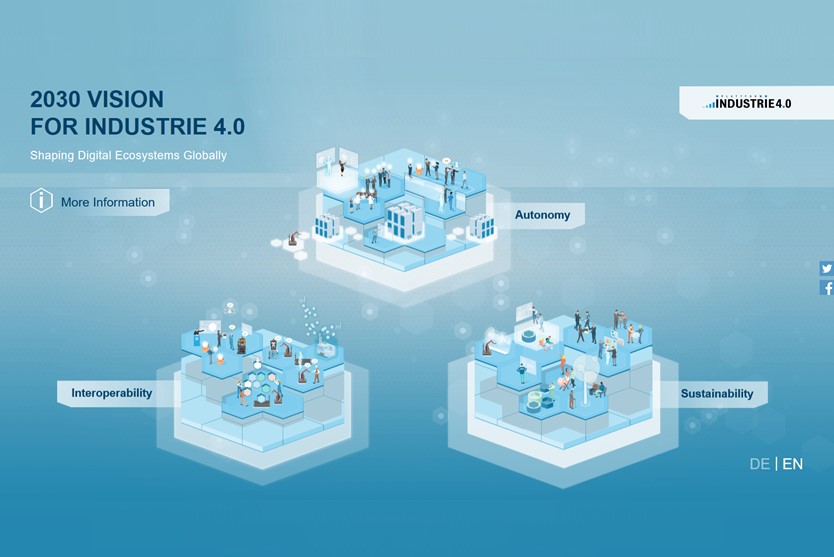
Dialogue on the digital future of industry
© GIZ
On 12 and 15 October 2020, the Deutsche Gesellschaft für Internationale Zusammenarbeit (GIZ) and the China Center for Information Industry Development (CCID) hosted two Web Conferences. Over 120 German and Chinese representatives from government, industry and academia joined the discussions on the most recent developments of digital business models and the impact of digitalisation on the labour market.
The two events showcased key findings of the White Papers drafted by leading German and Chinese experts from the expert groups “Digital Business Models” and “Future of Work” under the Sino-German Company Working Group on Industrie 4.0 and Intelligent Manufacturing. The Working Group serves as a platform for German and Chinese experts to jointly discuss and analyse challenges and opportunities of Industrie 4.0 and to develop recommendations for governments and industries of both countries.
COVID-19 as catalyst for digitisation and digital business models
The first web conference “Business Model Innovation in Times of COVID-19 – Insights from Germany and China”, was opened by Mr Ronald Metschies (GIZ) and Dr GAO Huifang (CCID). The conference featured two impulse presentations, followed by a panel discussion. Dr Steffen Preissler, Head of Division Knowledge and Technology Transfer of Fraunhofer Center for International Management and Knowledge Economy presented the key findings of the white paper “Value Network as the Foundation for Digital Business Models” including the identification of six digital business model types as well as key takeaways for companies to better harness the potentials of digital business models. [Download the full study here].
The study’s use case for the business model type “Efficiency” was introduced by Dr LI Junhai, Vice General Manager of Baowu Carbon Materials & Technology. Dr LI elaborated, for example, how their virtual factory increased productivity by 30%. Furthermore, the functionalities of the virtual factory ensured safe operations during the pandemic via AR smart helmets and remote maintenance across BAOWU plants in China.
The following panel discussion on digital business model innovation in Germany and China was moderated by Prof Dr Svenja Falk, Managing Director of Accenture Research. According to Ms YANG Wen (Haier COSMOPlat), the operational uncertainty during the pandemic has changed people’s mindsets towards taking their digital transformation more seriously. Mr Klaus Bauer observed that among TRUMPF’s customers, the acceptance of using remote services and the willingness to share data for machine optimisation have increased significantly during the pandemic. With regards to small and medium-sized enterprises (SME), Mr Christian Dorfmüller (Startup Factory) added how the pandemic has accelerated the adoption of cost reduction and efficiency projects. Furthermore, CTO DING Fuqiang shared his insights from China Telecom on how the crisis has greatly challenged telecommunication service providers since there was a massive surge in demand for digitisation and digital networks. Overall, all panellists agreed that COVID-19 has acted as a catalyst for the development and application rate of digital business models.
Empowering workers in the era of digitisation
The second web conference “Meeting the Skills Needs for the Future of Work” focuses on the challenges and opportunities digitisation has on the workforce and how to prepare for the future of work. Dr Tobias Arndt, General Manager from the Global Advanced Manufacturing Institute (GAMI) of Karlsruhe Institut für Technologie (KIT) and Lead Expert of the Expert Group on “Future of Work”, introduced the key findings from the White Paper “Employee Qualification as Key Success Factor in Digitalised Factories”, produced jointly by experts from both countries.
Digital transformation and technological advancement are shaping the skillsets and qualifications needed for the future. The White Paper aims at informing the industry on the impacts and advising on how companies can better bridge the skills gap using existing resources through the analysis of the various existing maturity models and the respective use cases. [Download the full study here].
Following the presentation, Ms Christin Fröhlich, Senior Policy Advisor for Industrie 4.0 and Digitisation at the BMWi, lead a panel discussion with experts from Festo Didactic, AHK Shanghai, Tongji University and Neusoft. The discussion took a broader look at how workers can be empowered in the age of digitisation in contrast to its commonly coined disruptive effects. Through the sharing of real-life experience and specific company approaches, the panellists provided insights on how sustainability can be realised through the balance of innovation and human development.
Dr Hans Jörg Stotz (board member at Festo Didactic) sees innovation and education as two sides of the same coin. Only when people are allowed to experiment and apply skills on the shopfloors, and not separate learning from work life, innovations can be realised. On the challenges Chinese companies are currently facing to upskill their workers, Prof CHEN Ming (Tongji University) shared the best practice of the Industrie 4.0 Learning Factory. By providing a fully equipped production environment companies are enabled to conduct training without affecting their normal production. When asked on mutual learnings between Germany and China, Ms Britta Buschfeld (AHK) descibed the strength of Germany in mobilising different sectors and social partners to act. China on the other hand shows its speed and openness to try out new things as well as the vitality driven by the younger generation. On the topic of AI, Mr XIE Shangfei (Neusoft) believed that AI empowers workers by improving work efficiency and quality. It also creates new jobs around the development, application and operation of AI-enabled platforms.
About the Sino-German Industrie 4.0 Project
Based on the Memorandum of Understanding (MoU) between the Federal Ministry for Economic Affairs and Energy (BMWi) and the Chinese Ministry of Industry and Information Technology (MIIT) signed in 2015, the Sino-German Industrie 4.0 cooperation aims to improve the business environment and facilitate bilateral cooperation between German and Chinese companies. The China Centre for Information Industry Development supports MIIT in this cooperation. On the German side, BMWi has commissioned the Deutsche Gesellschaft für Internationale Zusammenarbeit to support the implementation of the MoU.
Further information on the project can be found at: www.industrie40-china.org
You can subscribe to the project newsletter under the following link:
https://www.giz.de/en/mediacenter/newsletters.html
“Project and Program Newsletters”> “Sino-German Industry 4.0”



